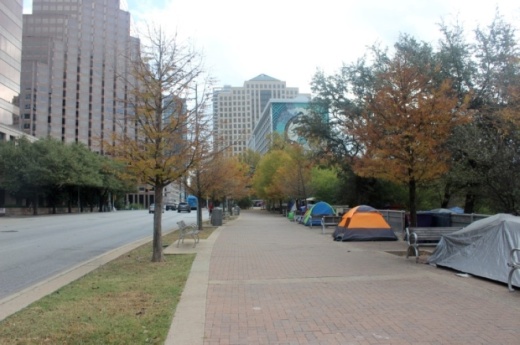Early the next morning on April 2, AFD said another fire caused damage at the Esperanza Community, the state-sanctioned homeless encampment site off of US 183 near Montopolis.
The two fires hours apart have put a renewed focus on Austin's growing homelessness problem. Data from the Ending Community Homelessness Coalition showed an 11% jump in the city's unsheltered homeless population from 2019 to 2020, and although there is no official data from 2021, tents have become more prevalent in the city, making the crisis more visible.
Chris Baker, executive director of The Other Ones Foundation, a nonprofit working to address homelessness in the city, said at an April 2 news conference the organization works with residents at the Esperanza Community and about 10 people lost the place they were staying in the fire.
"We're working as hard as we can to find alternative shelter for those folks and hopefully we will by next week," Baker said. "The question in the meantime is where do we go? The only really humane and dignified answer we can give to that question is housing."
In late March, Austin City Council directed city staff to develop a spending framework for the estimated $195.8 million coming to Austin from the federal government as part of the American Rescue Plan Act. Some of that money could be used to expand programs aimed at providing housing to people experiencing homelessness.
As it stands, the demand for public housing in the city far outweighs supply. Walter Moreau, executive director of Foundation Communities, said at the news conference the housing nonprofit had more than 1,300 applicants for its soon-to-open 132-unit complex Waterloo Terrace, located in Northwest Austin on MoPac.
"We need to do more. The need is great and we're not alone," Moreau said.
Meanwhile, Austinites are set to vote May 1 on a proposition that could add criminal penalities for camping or laying down in certain areas of the city. In 2019, Austin lifted ordinances that made it a crime for people to camp or lay down in public areas provided those people were not blocking a roadway.
After the fires, District 6 Austin City Council Member Mackenzie Kelly tweeted that she was astonished by the camp sites near the Buford Fire Tower after walking by before the fire on April 1. The tower, located at 201 W. Cesar Chavez St., Austin, was constructed in 1930 as a practice location for Austin firefighters, according to the National Parks Service.
"This is unsafe, unsanitary and ridiculous. Vote in favor of Prop B, y'all. It's a public safety issue," Kelly tweeted.
Sen. John Cornyn also called the fires "dangerous and unacceptable" in a tweet.
"If you live in Austin, please join me in voting for Proposition B on May 1," Cornyn tweeted.
But some local officials and nonprofit organizations say reinstating the camping ban will not address the problem.
"Proposition B won't house anyone. You can vote for this measure or not vote for this measure, it doesn't amount to a hill of beans if we don't house people," Mayor Pro Tem Natasha Harper-Madison said at the news conference.
Heidi Sloan with Homes not Handcuffs, a coalition of activists that promotes housing to address homelessness, said at the news conference passing Prop B would hold individuals experiencing homelessness responsible for a problem that is structural.
"Placing blame on someone who has been through something so difficult is the wrongheaded reaction," Sloan said.





